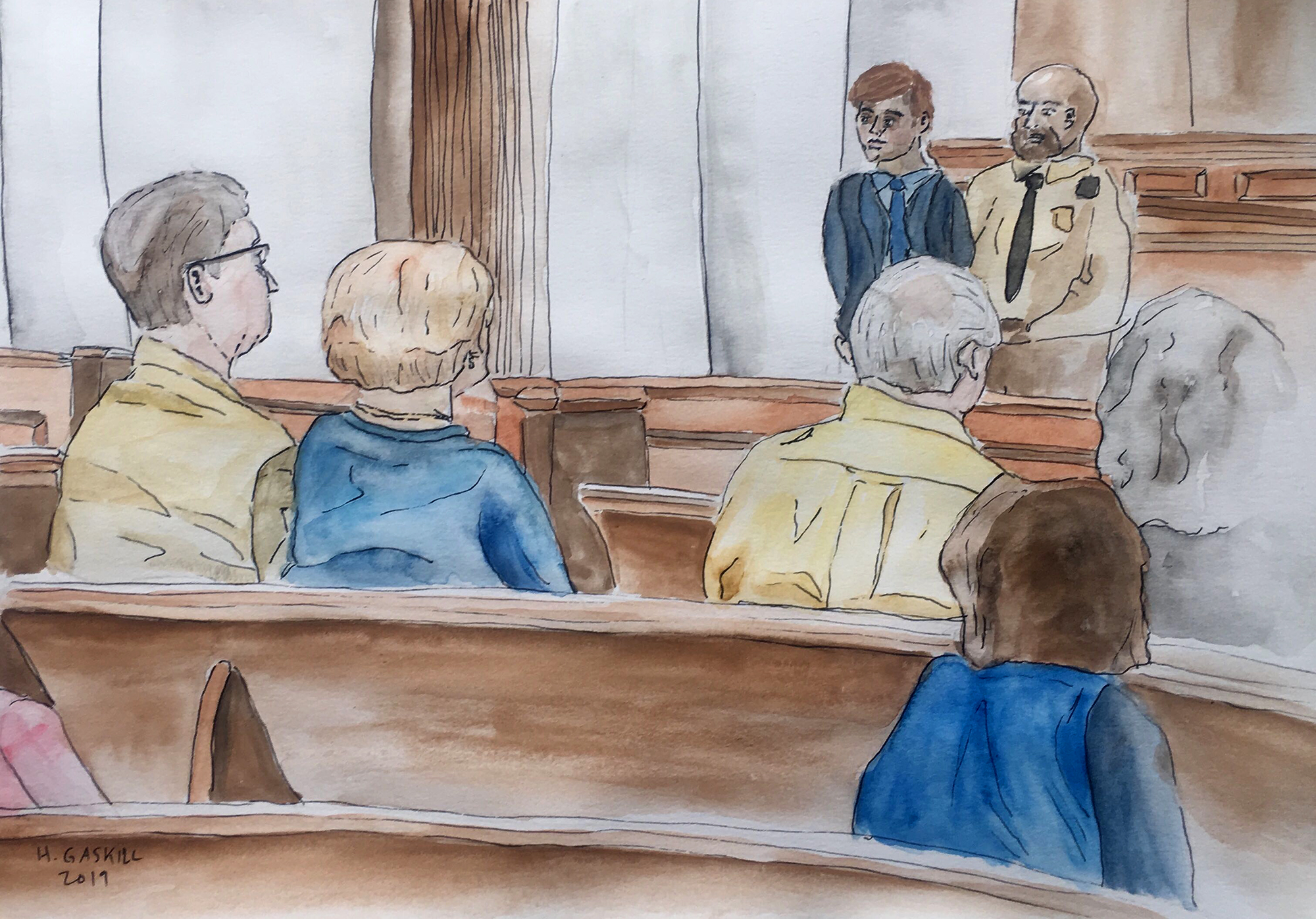By Leah Brennan and Jillian Atelsek
Senior staff writers
A judge decided Tuesday to drop the hate crime charge against Sean Urbanski, a former University of Maryland student accused of murder in the fatal stabbing of 2nd Lt. Richard Collins.
After the defense argued it was “utter speculation” that the killing was based on Collins’ race, Judge Lawrence Hill ruled the state hadn’t provided sufficient evidence to support the charge. Prosecutors’ case centered on racist memes that were saved to Urbanski’s phone and his membership in a white supremacist Facebook group called Alt-Reich: Nation.
One of Urbanski’s lawyers, John McKenna, pointed to the fact that there was no way to tell whether his client had viewed the memes on the day of the killing, and that no witnesses had suggested race was a factor.
“We believe there’s no evidence of a race-based killing in this case,” McKenna said.
The ruling means the jury will be tasked only with reaching a verdict on Urbanski’s first and second-degree murder charges.
Collins, who was black, was slain near Montgomery Hall in May of 2017, just days before he was set to graduate from Bowie State University. He was waiting for an Uber with two others when witnesses say Urbanski approached, yelled “Step left if you know what’s best for you” and plunged a knife in Collins’ chest.
[Read more: “Only the beginning”: Richard Collins’ family and friends are working to cement his legacy]
On Monday, prosecutors showed jurors a dozen memes that Urbanski had manually saved to his phone. One referenced throwing black people into a woodchipper, said prosecutor Jason Abbott. And a friend of Urbanski’s who was also a member of the Alt-Reich: Nation group testified that those memes were consistent with the content posted to the page.
McKenna disputed the characterization of the Facebook group as a white supremacist group, saying that was “simply not true.” It was a “controversial joke site,” he said.
Hill pushed back on that description.
“If there’s a website whose purpose is to tell jokes, but the jokes are racist, it’s the same thing,” Hill said — adding that a “laughing or mocking fashion” didn’t change that.
Ultimately, Hill turned to the language of Maryland’s hate crime statute — Urbanski would have had to commit the killing because of Collins’ race, an argument he said the state didn’t have sufficient evidence for. The defense leaned on the fact that Collins was the only person at the bus stop who “engaged” Urbanski by responding to his yelling.
Hill’s decision came minutes after the defense rested its case. Attorneys William Brennan and McKenna only called three witnesses to the stand. All three of them spoke to Urbanski’s level of intoxication on the night of the stabbing.
[Read more: Students gather for midnight remembrance of Richard Collins on his 26th birthday]
Aside from maintaining that Urbanski wasn’t motivated by racial bias, much of the defense’s case has centered around the claim that he was “out-of-his-mind drunk” at the time of the killing — too drunk to execute the premeditation required for a first-degree murder conviction.
Tuesday’s testimony centered on Urbanski’s blood alcohol level at the time of the killing. The defense showed a video of Urbanski singing and humming in his holding cell after the incident, repeatedly asking to use the bathroom. He muttered about waiting for the university’s Shuttle-UM Blue bus and his professional writing class.
“I don’t even know what’s going on,” he said at one point in the video.
Nicholas Lappas, a retired faculty member from George Washington University with expertise in forensic toxicology, told the court that peak blood alcohol levels occur about 30 minutes to an hour after a person stops drinking alcohol. If Urbanski left a bar as late as 2:30 a.m., then, his highest level would’ve been between 3 and 3:30 a.m. — around the same time frame as the killing.
At the time of the killing, Lappas estimated Urbanski’s blood alcohol level would’ve been between .17 and .24 percent — the latter of which is three times the legal limit to drive.
Prosecutors tried to strike Lappas’ testimony after he said he made the calculations in his head and that he didn’t analyze Urbanski’s blood samples himself.
But after Lappas clarified the simple calculation required to arrive at his conclusion, and did the math out loud in the courtroom, Hill shot down the state’s motion.
Later, the defense called forensic psychiatrist Brian Zimnitzky, who testified that alcohol can affect a person’s motor skills, speech and decision-making capabilities — an impact that gets stronger as blood alcohol levels rise.
On cross-examination, though, prosecutor Jonathon Church drove home that Zimnitzky was speaking only in hypothetical terms — he had never met or examined Urbanski, and he wasn’t familiar with the facts of the case.
The defense also attempted to drop the hate crime and first-degree murder charges Monday, but Hill struck it down, saying he believed there was “sufficient evidence” for the jury to potentilaly “return a verdict of guilty on both counts.”
But on Tuesday, after the jury had left the room and Urbanski’s lawyers had again made their case to Hill, he ruled the other way. The defense’s witnesses provided significant evidence of Urbanski’s intoxication, McKenna argued, while the prosecution hadn’t done the same for a hate-based motive.
The courtroom was gripped by confusion after Hill announced his ruling, with many unsure whether they’d heard him correctly. Once the decision was confirmed, the Collins family left the room, visibly distraught.
Both the prosecution and the defense will make their closing arguments Wednesday morning, and then the jury will be free to deliberate.
This story has been updated.



